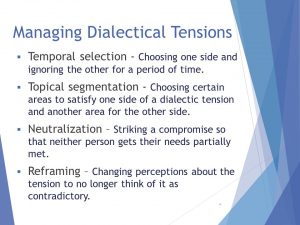Dr. Dawn-Elise Snipes PhD, LPC-MHSP, LMHC
Executive Director: AllCEUs.com
Podcast Host: Counselor Toolbox and Happiness Isn’t Brain Surgery
Become a member at DocSnipes.com to be able to chat with Doc Snipes via text or video chat.

Happy and Sad: There are always going to be things that make you sad. What makes you happy? If you are feeling “blah,” consider doing something that can help you feel happy or reconnect with the world (like hiking).
Love and Hate: You can love someone but hate their actions.
Anxious and Confident: You can be anxious/nervous about doing something such as giving a speech, but still confident in yourself as a professional. We all have things that we are better at, and things that can be considered “weak points.” Focus on yourself as a whole having balance in that way.
Sick vs. Well or Pain vs. Pain Free: You can have a head cold, but otherwise feel pretty good (heart, lungs, joints etc.) Likewise, you can have pain in one area, and be grateful for the fact that the pain is ONLY in that one area–recognizing that nobody is pain free or healthy all the time. If you find that you are sick or in pain more often then not, then it is a clue to seek alternate interventions.
Clean vs. Slob or Eating Healthy vs. Eating Junk Food: Find the compromise. My idea of clean and my teenager's idea of clean are different. From his point of view, his area is clean. From mine, not so much. Sometimes that means being clearer about what your expectations are. Other times, it means finding a compromise.
Competent vs. incompetent or Success vs. failure: Similar to being anxious and confident, you can also be competent and incompetent or succeed and fail at the same time. You are likely competent and successful at a lot of things. When things go awry, don't overgeneralize and say “I am incompetent.” Instead, say something like, I did not accomplish this part of the task well. When I used to write grants, there would be several sections to the grant. Overall I am a great grant writer, but I know that the budget area, which is highly detailed, was usually something that needed to be reviewed by our fiscal department. Identify what you succeed or are competent at, and find others who have complimentary strengths.
Self care vs. other care. To effectively care for others you must also care for yourself. If you feel too guilty about caring for yourself, you will burn out and find you are not able to care for others anymore either. You need to keep yourself healthy and balanced.
Freedom vs. Limits: In order to have the freedom to do what you want, you must also get the must dos done. Limits helps you be more efficient. Additionally, if there were no rules in society, it would be anarchy. Limits helps everyone get on the same page
Rebel vs. Submit (hold anger/grudges vs. accept/forgive) The more you rebel against others (parents, loved ones, etc.), the more you allow them to control you. You allow them to trigger your emotions and drain your energy.
Speak vs. Listen. The more you argue for your position, the less you will be heard, because the other person will start tuning you out and reasserting their points. Similarly, the more you listen, the less you will have to speak to get your point across, because you will know what the other persons concerns and desires are in a particular situation, so you can speak directly to those.
